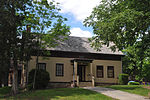Bowers-Livingston-Osborn House
1768 establishments in New JerseyHouses completed in 1768Houses in Morris County, New JerseyHouses on the National Register of Historic Places in New JerseyNational Register of Historic Places in Morris County, New Jersey ... and 3 more
New Jersey Register of Historic PlacesNew Jersey Registered Historic Place stubsParsippany-Troy Hills, New Jersey

Bowers-Livingston-Osborn House is located in Parsippany-Troy Hills, Morris County, New Jersey, United States. The house was built in 1768 and added to the National Register of Historic Places on June 19, 1973.
Excerpt from the Wikipedia article Bowers-Livingston-Osborn House (License: CC BY-SA 3.0, Authors, Images).Bowers-Livingston-Osborn House
I 80,
Geographical coordinates (GPS) Address Nearby Places Show on map
Geographical coordinates (GPS)
| Latitude | Longitude |
|---|---|
| N 40.864722222222 ° | E -74.426666666667 ° |
Address
I 80
07054
New Jersey, United States
Open on Google Maps






